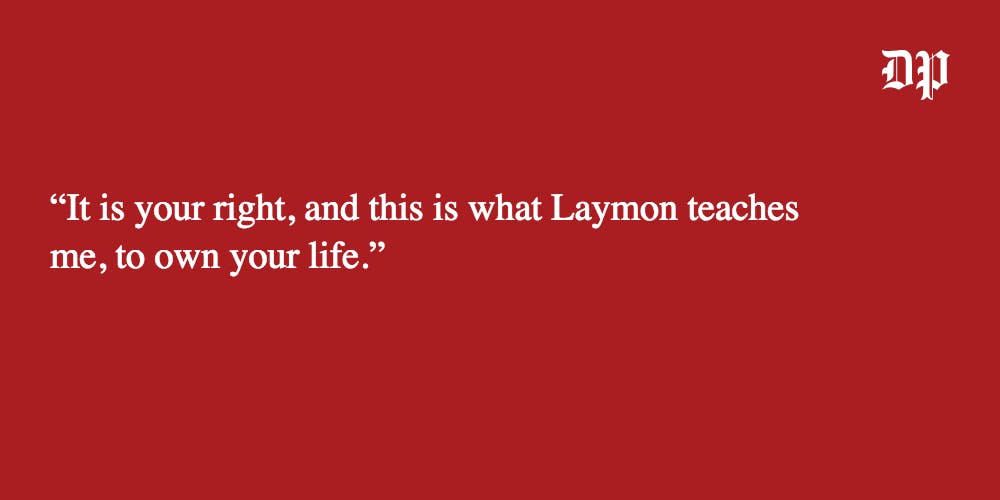
I read this excerpt of Kiese Laymon’s collection of essays “How to Slowly Kill Yourself and Others in America” almost weekly. It is, in big part, an essay that explores violence surrounding guns and the life of a black boy — Kiese Laymon — growing up in Mississippi. More importantly, he examines how we kill and save each other every day in ways that have nothing to do with guns.
I am not a black boy, have never been to Mississippi, and have never held a gun or seen one pointed. I am a college student aspiring to be a writer, though, much like Laymon in the essay. As an opinion columnist for The Daily Pennsylvanian, I now have the ability to write about my own truths, but there are still topics I keep pushing off because, really, I’ve been scared.
In two of Laymon’s five experiences having a gun pulled on him, he is the person holding the gun. He gets to one of those points — sitting in a cold bathtub in a damp, dark bathroom, sweating, humming, and thinking of his grandma, the barrel of a gun pressed to his temple — in short, because he got kicked out of school for writing things that people were scared to see. He is named “a controversial writer who consistently editorializes on race issues” by the president of his college, is sent a letter full of the ashes of his burnt articles, and has an essay written by an English professor about why a student in the class says “Kiese should be killed for what he is writing,” all before he gets expelled for not checking out a library book.
As Kiese puts it, his “life kinda hurts.”
This essay is praised as a poignant narrative about racial issues and gun violence. All it actually is, though, is a recalling of memories.
Writing is essentially the practice of constantly recalling your own truths and Laymon does not allow fear to limit his voice. Laymon touches on some painfully accurate feelings in the piece, where his true, honest-to-God hurt shows — that takes some nerve. I look up to Kiese Laymon as a writer for many reasons — his complex yet direct prose, his inventive ways of talking about things that matter, his unique voice — but I find that what I most admire is the unapologetic manner in which he snatches ownership of his own life and experiences.

When it comes down to it, any experience I have is likely tied up with someone else’s. Every experience I have, especially the negative ones, will likely be seen as offensive by at least one person involved. There is an assumption in the statement that Laymon should be killed for his writing, that it is OK for these experiences to be had by him, but not to be shared with others. I haven’t had any experience near as violent as Laymon has regarding my writing and I hope I never do. But one day, maybe it will cross someone’s mind that they’d rather have me dead than writing. Laymon shows me that none of that matters; my story is still mine to share.
The other reason I go back to the piece so often is its message. He delves into the ways that life tries to hurt us, how we hurt each other when we’re hurting, how we’re all looking for an escape from what we’re feeling, but that we save each other, too. In the funk of his life, he elaborates: “Some days, [my best friend] Gunn and I save each other's lives just by telling and listening to each other's odd-shaped truth.”
The point is, if you write or if you don’t, there are parts of yourself that you may hold back in fear. Maybe you avoid relationships because you think deep down, there’s something about you that isn’t worth loving. Maybe you keep your bank account near zero in attempts to keep up with friends that have the privilege of not having to think about money. Maybe you have friends that don’t understand what makes you tick because you have never let them see.
Writing is how I communicate — writing character sketches to show people how I see them, love letters to show how I feel, essays to show how I think. It is your right, and this is what Laymon teaches me, to own your life. Whatever your means of expression, know that you may offend some by your truth, but that you also have the ability to save just by “listening to each other's odd-shaped truth.” Do that.

KALIYAH DORSEY is a College freshman from Pennsauken, N.J., studying English. Her email address is kaliyahd@sas.upenn.edu.
The Daily Pennsylvanian is an independent, student-run newspaper. Please consider making a donation to support the coverage that shapes the University. Your generosity ensures a future of strong journalism at Penn.
Donate







